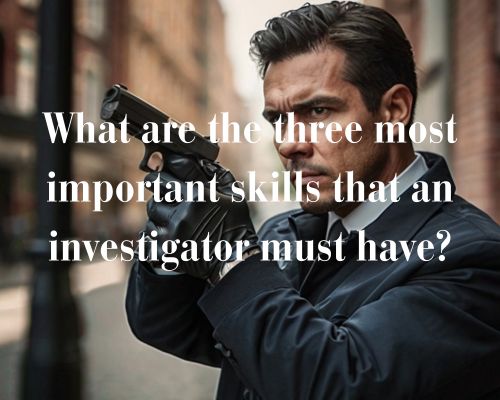Based on Ali Private Investigator Tampa, when diving into the world of investigations, whether in law enforcement or private sectors, having a refined set of skills is essential.
Curiosity is the cornerstone of any successful investigator. It drives you to ask the right questions and persistently seek out answers when the trail goes cold. This unyielding desire to uncover the truth separates ordinary investigators from extraordinary ones.

Equally critical is the ability to think critically and analyze situations from various angles. Employing critical thinking allows you to piece together clues and construct plausible scenarios, making sense of complex cases where others see chaos.
The skill to observe keenly, capturing details others might miss, amplifies your ability to gather substantial evidence and leads.
Lastly, strong communication skills are indispensable. Being able to effectively interview witnesses and suspects, as well as presenting your findings clearly and comprehensively, ensures that the truth is communicated accurately and convincingly.
Core Investigative Skills
You must hone a variety of skills to excel in investigations, particularly with an emphasis on critical thinking and effective communication. These abilities are essential for gathering accurate information and reaching sound conclusions.
Critical Thinking and Analysis
Critical thinking and analytical skills are essential for any investigator. You need to evaluate data, pinpoint inconsistencies, and derive logical conclusions.
This requires a detail-oriented approach to scrutinize every piece of evidence and ensure no stone is left unturned.
Analytical skills also involve problem-solving. In complex cases, you’re often faced with incomplete or ambiguous information. Through rigorous analysis, you can determine what is relevant and what questions need answering.
Good training and education can enhance these skills, enabling you to interpret findings accurately.
Effective Communication and Interviewing
Effective communication is paramount in investigative work. You must articulate your findings clearly in reports and verbal presentations, ensuring stakeholders understand your conclusions, just like what Ali Private Investigator Tampa do.
Report writing should be precise and comprehensive, documenting each step taken and the rationale behind conclusions drawn.
Interviewing witnesses and suspects requires strong interpersonal skills. You need to build rapport quickly, asking the right questions to elicit important information.
This involves listening actively and observing non-verbal cues to assess credibility.
Proper training can equip you with advanced interviewing techniques, ultimately bolstering your investigative outcomes.
Legal Knowledge and Ethical Conduct
An investigator’s proficiency in legal knowledge and ethical conduct ensures the integrity and reliability of their work. These skills are essential for navigating the complexities of criminal justice and upholding the standards of the legal profession.
Understanding of Legal Framework
Understanding the legal framework is crucial for an investigator. You need to be well-versed in various laws, regulations, and procedures that govern investigations.
This includes knowledge of civil and criminal law, as well as specific statutes relevant to the cases you handle.
When gathering evidence, it is important to ensure compliance with legal standards to prevent any challenges in court. Missteps in this area can lead to evidence being deemed inadmissible or cases being dismissed. Therefore, certification and continuous education in relevant legal aspects are essential.
Staying updated on recent changes in laws and court decisions is necessary. This knowledge helps you adapt to new legal requirements and maintain the credibility of your investigations.
Ethical Standards in Investigations
Ethical standards are the backbone of any investigation. You must adhere to strict ethical guidelines to ensure fairness and integrity in the criminal justice system.
This includes maintaining impartiality and avoiding conflicts of interest.
Integrity is non-negotiable. Whether you’re collecting evidence or interviewing witnesses, your actions must be beyond reproach.
Any unethical behavior can compromise an investigation and damage public trust in legal processes.
Ethical conduct also involves respecting the rights and dignity of all individuals involved. This includes protecting privacy and ensuring that your methods align with both legal and ethical standards.
Certification programs often emphasize these principles, underscoring their importance for reliable and responsible investigations.